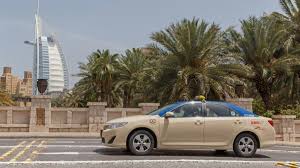Dubai Taxi Fares: Dubai residents are once again facing higher taxi fares as the cost of living continues to climb. The Dubai Taxi Company has announced a new per-kilometer rate of Dhs2.14, marking another increase in recent months.

This latest hike follows a series of adjustments to taxi fares, reflecting the rising cost of fuel. Previously, the per-kilometer rate stood at Dhs2.21, Dhs2.09, and Dhs1.97, respectively.
Dubai Taxi: Fuel Costs and Fare Increases
The correlation between fuel prices and taxi fares is evident. As petrol costs have soared in the UAE, taxi companies have been forced to pass on these expenses to passengers. The average price of Super 98 petrol in June 2024 reached Dhs3.14 per liter, a significant increase from the previous year.
While January 2024 saw a slight decrease in fuel prices, the overall trend has been upward, putting pressure on transportation costs.
How Taxi Fares Are Calculated
The total fare for a taxi ride in Dubai comprises several components:
- Base fare: A fixed amount charged at the beginning of the journey.
- Per-kilometer rate: The cost for each kilometer traveled.
- Waiting time: A charge for time spent in traffic or waiting for the passenger.
While the base fare remains at Dhs12, the fluctuating per-kilometer rate directly impacts the overall cost of a taxi ride.
Impact on Passengers
The repeated increases in taxi fares have put a strain on residents’ budgets. With the cost of living already on the rise, higher transportation expenses add to the financial burden. Many commuters are exploring alternative modes of transport, such as public buses or the metro, to save money.
Taxi Companies Respond to Rising Costs
The Dubai Taxi Company has reported a significant increase in revenue during the first quarter of 2024. This growth can be attributed to higher fares, increased passenger demand, and an expanded fleet, particularly at Dubai International Airport.
The company emphasizes that the adjustment in taxi fares is necessary to offset the rising cost of fuel and ensure the sustainability of the taxi service.
The Road Ahead
It remains unclear whether taxi fares will continue to rise in the coming months. Much depends on the fluctuation of fuel prices in the global market. Passengers can expect to pay more for their taxi rides until fuel costs stabilize.
As the UAE government continues to focus on sustainable transportation options, it is possible that investments in public transportation infrastructure will alleviate some of the pressure on taxi services.
In conclusion, the recent increase in Dubai taxi fares is a direct consequence of rising fuel costs. While this development is undoubtedly inconvenient for passengers, it reflects the broader economic challenges faced by the transportation industry.

